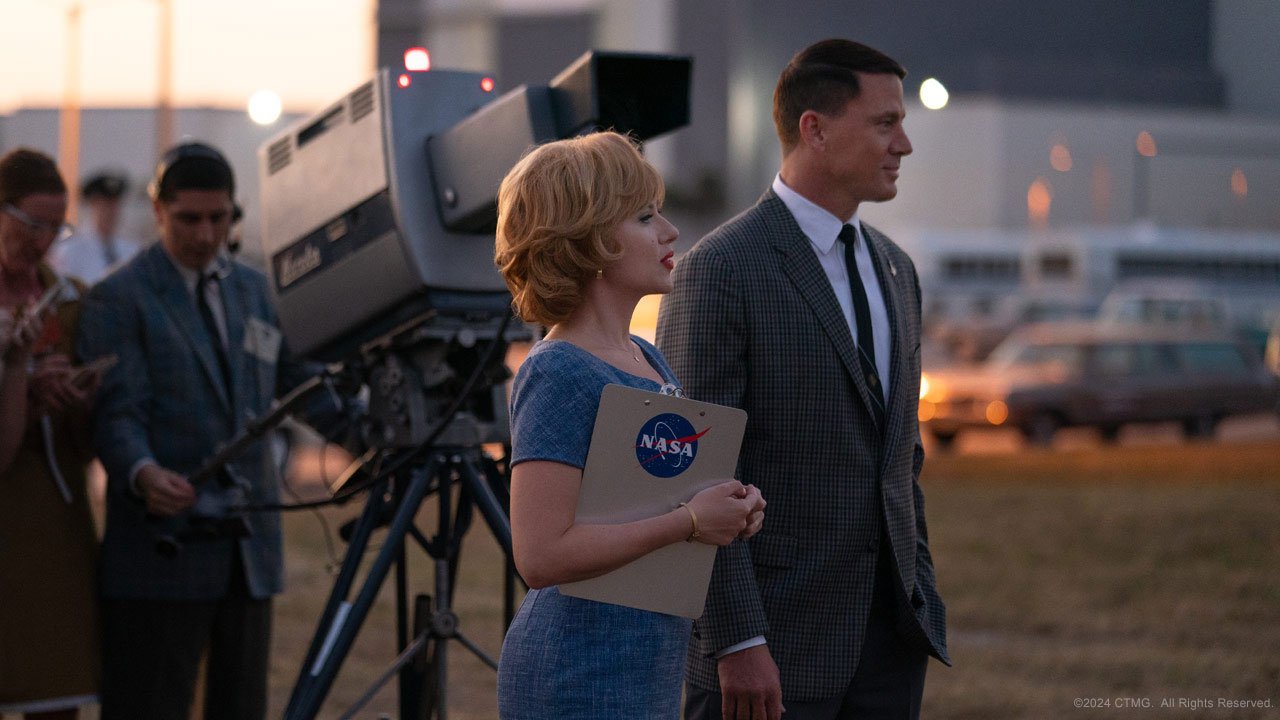
Fly Me To The Moon
July 9, 2024 / Kevin Ward — ★★★½☆
Greg Berlanti's Fly Me to the Moon conjures the romanticism of the space race that dared a nation to dream for the Moon but lacks any real romance between its stars. Scarlett Johansson and Channing Tatum take the lead in this film, marketed as a romantic comedy set against the backdrop of a top-secret operation to film a fake version of the moon landing—a version that could air for the world to see in the event the actual Apollo 11 mission is a failure. The film is much less farcical than that premise sounds and actually explores an underseen aspect of the space race, even if it's a largely (perhaps wholly) fictionalized account.
Scarlett Johansson shines as Kelly Jones, a marketing virtuoso who can sell anything to anyone. Her character is fierce, feminine, and endlessly charming, evident in her brilliant character introduction, where she dresses down a room of Ford executives in her pitch to land their marketing business. Channing Tatum plays Cole Davis, the launch director for the Apollo 11 mission, who is under tremendous pressure to outpace the Russians despite dwindling budgets and resources. And idling in the background is Woody Harrelson as Moe Berkus, the federal agent overseeing the Apollo 11 mission and empowered by the commander-in-chief to ensure its success—even if it is a failure. Berkus hires Jones, or more accurately, strongarms her away from Ford. He sees in her someone who could sway public support for the space race that, up to this point, the U.S. was losing.
Fly Me to the Moon offers a fascinating exploration into the political and social machinations behind one of America's most iconic achievements. The film's in-depth look at the heavy marketing of the moon mission as a means to garner support for the race and a ploy to keep the lights on at NASA is genuinely enlightening. This aspect of the film works best, offering three compelling elements. First, seeing this lesser-known aspect of the space race is intriguing. Second, the immaculate production design and recreation of sets, costumes, and cereal boxes look fantastic and perfectly play the nostalgia card, immersing the audience in the era. Third, it is endlessly entertaining to watch Johansson's fast-talking sales pitches as she disarms every person she meets.
Where the film falls short is in the portrayal of the romance between Johansson's Kelly and Tatum's Cole. After their initial meet-cute in a diner, their relationship becomes very antagonistic. Jones's objective of marketing the Apollo mission often puts her at odds with Davis's safety objective. Their relationship takes on this hot-and-cold dynamic, with moments of intense disagreement followed by only very brief periods of understanding. It never feels authentic. Both characters are rude to each other, stepping on each other's toes without considering collaboration. As an audience, we're not given many reasons for them to like each other outside of the obvious--people are generally attracted to people who look like Scarlett Johansson and Channing Tatum. They have some chemistry, and both actors give good performances, but the script lacks any real spark or emotion.
The film draws its emotional power from its evocative portrayal of the space race and the relentless pursuit of a dream. It includes powerful moments, such as playing President Kennedy's famous speech:
"We choose to go to the moon in this decade and do the other things, not because they are easy, but because they are hard…"
This scene alone is enough to stir a sense of pride and wonder. Equally moving is the portrayal of Walter Cronkite removing his glasses and being momentarily speechless during the moon landing broadcast and Neil Armstrong's iconic words,
"That's one small step for man, one giant leap for mankind."
These moments anchor the film in the historical significance of the mission but also lean into the emotional resonance of the era. I know nostalgia can feel like a shortcut to emotion, but it works when it works. Hats off to the production team for its pristine recreation of everything from fashion to cultural references. The set design and cinematography transport the audience back to an era when the space race dominated national consciousness. Standout design elements include the detailed hangar bays, the convincingly crafted faux moon landing set, and the authentic recreations of moon marketing materials such as Omega watch ads, Wheaties boxes, and Tang. These touches are beautifully recreated with a vibrance that enhances the film's period feel. And the toe-tapping 60's soundtrack will help keep the good vibes going.
The last point I want to touch on is that although this is inspired by historical events, I was happy that screenwriter Rose Gilroy didn't tie this too closely to facts to make it very clear this is a work of fiction. There is no Cole Davis or Kelly Jones. And even though the film posits the notion that "The truth is still the truth, even if nobody believes it," and that "... a lie is still a lie, even if everybody believes it.," I don't necessarily prescribe to fanning the flames of conspiracy theories. It's a tricky line to toe, and Gilroy has done it with incredible skill.
Fly Me to the Moon is a cute movie. While it may not deliver on the romcom front, it playfully captures the spirit of an era defined by ambition and innovation. It makes up for its shortcomings with its heartfelt tribute to the space race and the collective effort to achieve the impossible.
Director: Greg Berlanti
Screenplay: Rose Gilroy
Cast: Scarlett Johansson, Channing Tatum, Jim Rash, Anna Garcia, Donald Elise Watskins, Noah Robbins, Colin Woodell, Christian Zuber, Nick Dillenburg with Ray Romano and Woody Harrelson
Producer: Jonathan Lia, Scarlett Johansson, Keenan Flynn, Sarah Schechter
Runtime: 132 minutes
Rated: PG-13

